- Home
- Michael Scott
Saint Patrick Page 6
Saint Patrick Read online
Page 6
The story of how I had lit the fire and then faced the High King and his Druids at Tara traveled quickly—and, of course, grew in the telling. There were very few people in Erin who did not know my name.
I found that wWherever I went, crowds gathered and listened to me. I often used the tiny shamrock, which grew nearly everywhere, to explain how my God could be both three and one at the same time.
Ordinary people believed me more easily than nobles. Some of the lords and ladies found it difficult to accept that I—a bald, dark-skinned man who had once been nothing more than a shepherd—could be God’s messenger. Some laughed at me; some ignored me. Others threatened me.
One man, a bandit chief named Macool, even tried to trick and kill me.
It happened on a day when I had slipped away from a crowd who had come to hear me speak. I wanted to have a little time to myself, to walk in the fresh green hills and talk to my God alone.
Sometimes, with all the traveling and people always around, I felt I didn’t spend enough time in prayer. I tried to find a little space in every day to calm my mind and direct my thoughts toward God. And for me, God is always found in the open spaces, in forests and on hills, beside lakes and sea.
Dichu had warned me that a dangerous bandit lived in a fort on one of the hills. I had not realized just how close I had come to his home as I set out to pray. That is, until I heard riders galloping down the rocky road toward me. Who could they be? I wondered at first. Then I felt that cold wind on the back of my neck that told me Victoricus was near.
“Beware, Patrick…,” the angel’s crystalline voice whispered in the back of my head. But I didn’t need his warning. I knew I was in trouble. Four chariots filled with wild-looking men veered around the bend, into the road before me. Their leader, a huge, rough-looking man with a shining bald head and a tangled beard, halted his chariot before me, so that dust and grit went flying everywhere.
“You are Patrick, the one they call the Holy Man?” he asked aggressively.
“I am called Patrick,” I said, my voice calm.
“I am Macool,” he grunted. “One of my men is ill,” he said with a smile that showed his broken teeth, “but if you were to cure him, I would follow you, and I’m sure many of my men would give up their old ways and follow you too.”
I did not believe him. This man would never give up his old ways; it was plain to see. He smelled of evil and foul deeds. But I said, “Take me to this man.”
I rode in the back of Macool’s chariot along a rough, pitted track. He led us to a sturdy-looking fort perched on the crest of the hill. There were guards on the gates, and others patrolled the grounds.
I followed Macool inside. While the walls of the fort were strong and unbroken, the inside was a ruin. The buildings were tumbled in mounds of broken wood and stone, and the ground was a sea of ankle-deep mud. At the back of the fort was a long, wooden building badly in need of repair.
“This way,” the bandit said roughly.
I followed him, wrinkling my nose at the stale, damp smell. The only light came through the door and through a hole in the ceiling where the roof had fallen in. Most of the room was in shadow.
In the center of the room, below the circle of light that came in through the roof, a man was lying on the ground, covered with a moth-eaten woolen blanket.
“He is ill,” the bandit said with a broad grin. “Cure him, and we will follow you.”
There was laughter from the shadows, and I realized then that the room was filled with people. I walked over to the man on the ground and looked down at him. I immediately knew that there was nothing wrong with him. The angel Victoricus whispered in my head, and I knew what to say.
I looked at the bandit chief. “I can do nothing for this man,” I said. “He is dead.”
The bandit threw back his head and roared with laughter. “I knew you were not a holy man,” he said. “I knew you were nothing more than a trickster.” He turned to his guards. “Seize him. We will tell the whole country what he is and then kill him.” He looked at the man lying on the ground. “You can get up now.”
The man didn’t move.
The hall—which had been noisy with shouts and laughter—gradually grew silent. Eventually, it was so quiet that I could hear water dripping somewhere off in the shadows.
“Get up, Finn,” the bandit chief demanded loudly. Nobody moved. The bandit walked across the muddy, straw-covered floor and, with the point of his sword, pulled the blanket off the man. Then he knelt and put his hand over the man’s mouth. When he looked up, his face was pale. “He’s dead,” he whispered. He stood and turned to me. “Did you kill him.”
“No,” I said truthfully.
“You are a Holy Man,” he said, sounding almost surprised.
“I am follower of the True God,” I said simply. “He protects me from men such as you.”
Macool looked down at the dead man and then at me. “I think I would like to know about this God of yours,” he said. “He must be powerful indeed.”
“He is.”
“Tell us about him.”
And so, in that dim and damp building, I spoke to Macool, the bandit, and his men about the One True God. While some of them choose not to believe me, many—even Macool—were baptized into the faith that day.
I don’t know where Macool is today, but one of the brothers told me that he had met a monk on the Isle of Mona, which lies in the sea between the Land of Erin and the Land of the Britons. The monk told him that he had been a bandit until he had met Patrick the Holy Man, and that he had been called Macool. Perhaps it is the same man.
* * *
—
I have heard many stories about the miracles I worked when I walked the long roads of Erin. Some are based on events that really happened. Some are as new to me as they are to you: they didn’t happen—but people would like to think that they did.
I remember hearing a story that told how I had driven the serpents from Erin. But there were never any snakes in Erin! I suppose this story grew up because people think that serpents represent evil, and it is true that I did help to banish much of what was evil in the land.
There is one particular story that I have heard again and again, and every time I hear it, it grows stranger and stranger, until now, I find it difficult to recognize. But this is the story—the true story—of how I founded the large community at Armagh.
This happened a short time after my encounter with Laoghaire, the High King. I decided that I wanted to establish a place where a large number of Christians could meet and pray together. I wanted it to be a special place, on good high ground, and with rich farmland around it so that the brothers who lived there would be able to support themselves.
One day, close to the end of the year, I discovered the place—a tall hill topped with willow trees. It looked down upon several broad green fields, and there was a freshwater stream close by. It was perfect. I stood in one of the fields and looked up at the hill, and when I closed my eyes, I could actually see the fine stone building that would one day rise there and become a center for the Christian faith in Erin.
My followers told me that all the land thereabouts was owned by a man named Daire. He followed the old pagan ways and—though not an evil man—was no friend to the Christian faith. So I went to him and asked if he would give me the land on the high ridge to establish my community.
He was a short, stout, red-faced man with thick black hair sprinkled with gray. His eyes were the color of slate. He looked at me with those hard eyes and said, “Why should I give you this piece of land?”
“Because I have a vision for what it can be,” I said simply.
“And should I give away my land to every beggar who comes to my door?” he demanded loudly, his face becoming redder as he spoke.
“I am not a beggar,” I began. “If you doubt me, you may s
end a messenger to Laoghaire, and he will tell you—”
Daire interrupted me. “I have heard about you, Patrick the Briton. I have heard you are a powerful man, a magician.”
“I am not a magician,” I said, thinking that perhaps I would have that carved on my tomb: Here lies Patrick. Not a magician.
But the man shook his head. “You would not have been able to do what you have done without magic of some sort. Because you are a friend of the king and queen, I will give you some land,” he continued, “but not the high ground. That you cannot have. You may use the fields at the foot of the hill.”
“The high ground would be better,” I said.
“You will take what I offer you—or you will have nothing,” he grunted.
So I took the field at the bottom of the hill.
Everything was fine for the first few days. We built a small wooden shelter at the bottom of the hill, and some of the brothers began to prepare the land for planting. Daire came every day, his face set in an angry scowl, and I knew that even though he had given me the land, he hadn’t really wanted to.
I was sitting on a broad, flat stone on the morning of the third day, just finishing my prayers, when I saw Dichu running across the field toward me.
“What’s wrong?” I demanded, hurrying down the winding path toward him.
“There’s a horse in the field,” he panted, pausing to breathe. “It’s one of those big warhorses, and it’s wild. No one can go near it; it snaps at anyone who approaches, and it could easily kill a man.”
“Do we know who owns it?” I asked, but I had already guessed the answer.
“Oh, it’s Daire’s,” Dichu said immediately. “His groom actually led the horse to the field and released it.”
“He is trying to get rid of us,” I said, and hurried down the path.
The horse was running around the field we had been given, trampling the few vegetables the brothers had planted, eating what little greenery poked through the top of the soil. The horse was huge, standing even taller than Dichu, who was a head and more taller than I. Its eyes were wide and wild, and its teeth were as long as my fingers. Most of the brothers were standing outside the field, safe behind a tall hedgerow, but a few crouched inside our half-finished building while the raging horse galloped around outside. On the far side of the field, I could see Cian, Daire’s groom, a small, dark-skinned man, leaning against a tree, a broad smile on his face.
When I walked over to him, he did not acknowledge me.
“You are going to take this horse away before—”
“Before what?” he interrupted me.
“It is a fine horse. I would not like to see anything happen to it.”
“Nothing will happen to the horse,” Cian said confidently. “No one will be able to get close to him, and anyway, I intend to stay here all night and guard him.”
“Your master gave us this field,” I reminded him.
Cian nodded. “He did. But it was the horse’s field long before it was yours.”
I walked away, ignoring his laughter.
The following morning, when the white mist rolled off the field, the horse was dead.
The groom raged and swore at us, but there wasn’t a mark on the creature. Cian sat on the damp ground and cried over the beast as if it had been a member of his family. And when he looked up at Dichu and me, he swore, “When Daire hears about this, he will kill you!”
But it wasn’t Daire who came to us later that day. It was two strangers: small, quiet men in a rickety chariot. Neither was armed. They said they had been sent by Aoife, Daire’s wife. Daire was ill, they said, and Aoife was begging for something, anything, that would cure him. And she swore that if I could cure her husband, she would convert.
“Where is Cian?” I asked, looking at each man in turn.
They looked at one another, and then the older of the two men spoke. “He is on his way here; we passed him on the road.”
I guessed that Aoife had sent the men on ahead of the groom for some reason. Still trying to work out the puzzle, I walked over to where the small, clear spring ran alongside the field. Stooping, I filled a flask with ice-cold water. I gave it to the two men and then blessed the flask while they held it in their hands.
“Sprinkle some of this on Daire and he will get well.”
Both men bowed, thanked me, and immediately climbed into their chariot and rode away.
* * *
—
The sun had almost set when the groom appeared. He was carrying a spear, and there was another strapped to his back. He was red-faced and panting, covered in dirt and dust, and he looked as if he had run all the way from Daire’s fort. “I’ve come to kill you, Patrick,” he shouted, “just as you killed the horse and my master.”
I walked out of the half-finished hut and stood in the middle of the field to face him. “What do you mean?” I demanded.
“Daire is dead.”
“I am not!”
The voice came from the hill above us, and we both strained to see. There, in a chariot under the branches of the willows, were Daire and Aoife. “Do I look dead to you?” Daire shouted at the groom.
I looked from Daire to the groom—and Cian gasped. He looked as if he was about to fall down dead with shock himself. “But…you were dead.”
Daire nodded. “And the Holy Man’s medicine made me well again. Patrick, you may have the high ground here—aye, and all the land surrounding it. And perhaps you will come to my fort tomorrow and tell us about this god of yours.”
And that is how I got the land where the great church at Armagh now stands.
I learned more of the story much later.
When Cian brought him news of the death of the horse, Daire had flown into such a rage that he had collapsed and died almost immediately—but not before he had given the groom the order to kill me. His wife, fearing my power, and perhaps thinking that I would put a curse on everyone, sent her two servants to ask for some cure for her husband. You see, she believed that if I gave her a cure, her husband would live again. And it worked.
But I don’t believe I raised a man from the dead; only the Lord can do that. Perhaps Daire had only fainted and the cold water revived him. I don’t know. But I do know that the water I blessed had also revived the horse and brought it back to life. And the horse had been dead; I know because I checked the beast myself.
I would like to think that there are miracles in this world, and it would be nice if I really did work all those miracles people say I did. But the only miracle I worked was that I changed this land into a Christian country.
That was a miracle.
Epilogue
“That was a miracle….” The old man’s voice trailed into silence. He closed his eyes and lay back against the hard pillows, breathing easily.
“The bishop is tired, brother,” Abbot Benin said softly. “It has been a long day for him. Let him sleep.”
Brother Conor touched the wax writing tablet in his hand. “Father Abbot,” he said, “the bishop makes it all seem…” He paused, lost for words.
“So ordinary?” the abbot suggested.
The young man nodded quickly in agreement. “So ordinary.”
The abbot smiled and led the young monk out into the corridor. “He makes it seem ordinary because Patrick is an extraordinary man. I have no doubt that one day he will be recognized as the patron saint of Ireland!”
About the Author
An authority on mythology and folklore, Michael Scott is one of Ireland’s most successful authors. A master of fantasy, science fiction, and horror, he was hailed by the Irish Times as “the King of Fantasy in these isles.” Look for the six books in his New York Times bestselling The Secrets of the Immortal Nicholas Flamel series: The Alchemyst, The Magician, The Sorceress, The Necromancer, The Warlock, and The Enchantress. You
can visit Michael Scott at dillonscott.com and follow him on Facebook and Twitter.
What’s next on
your reading list?
Discover your next
great read!
Get personalized book picks and up-to-date news about this author.
Sign up now.

 The Warlock
The Warlock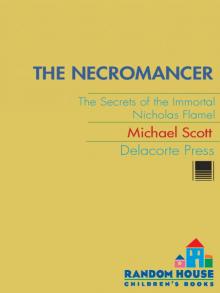 The Necromancer
The Necromancer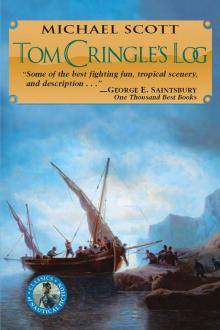 Tom Cringle's Log
Tom Cringle's Log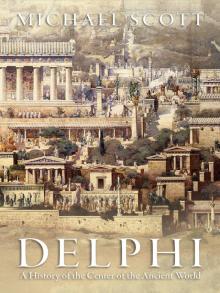 Delphi
Delphi The Magician
The Magician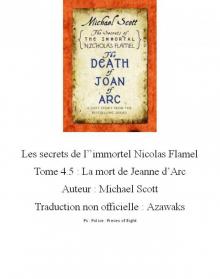 La mort de Jeanne d'Arc (trad. privee)
La mort de Jeanne d'Arc (trad. privee)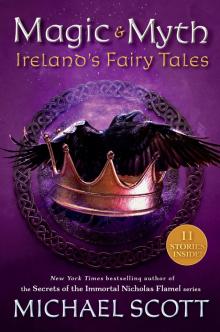 Magic and Myth
Magic and Myth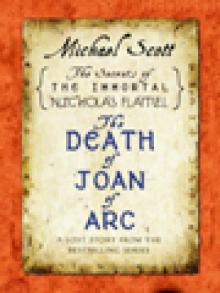 The Death of Joan of Arc
The Death of Joan of Arc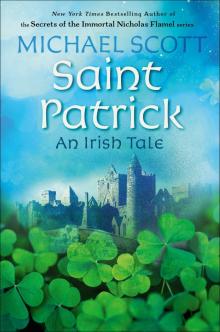 Saint Patrick
Saint Patrick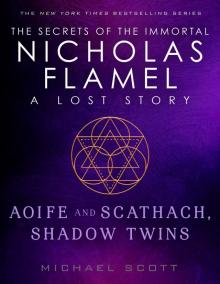 Aoife and Scathach, Shadow Twins
Aoife and Scathach, Shadow Twins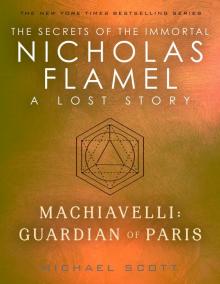 Machiavelli
Machiavelli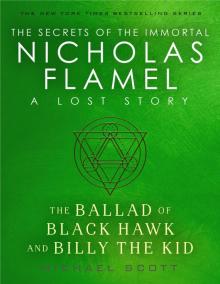 The Ballad of Black Hawk and Billy the Kid
The Ballad of Black Hawk and Billy the Kid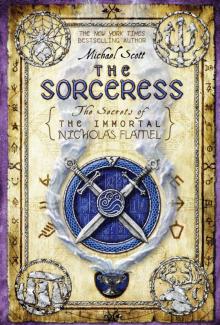 The Sorceress
The Sorceress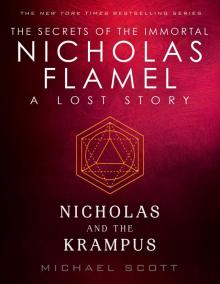 Nicholas and the Krampus
Nicholas and the Krampus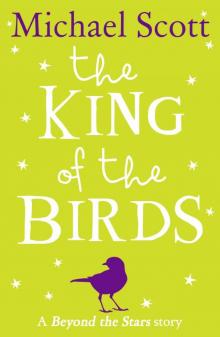 The King of the Birds
The King of the Birds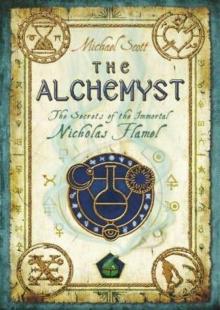 Nicholas Flamel 1 - The Alchemyst sotinf-1
Nicholas Flamel 1 - The Alchemyst sotinf-1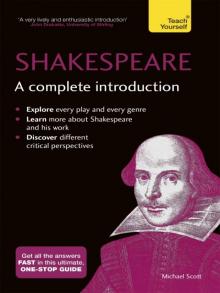 Shakespeare- a Complete Introduction
Shakespeare- a Complete Introduction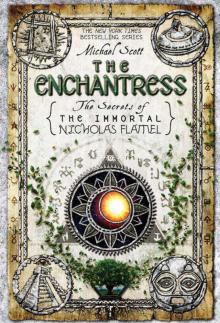 06 The Enchantress
06 The Enchantress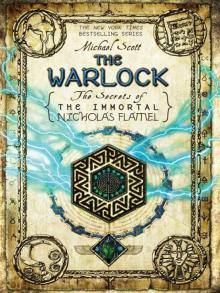 05 The Warlock
05 The Warlock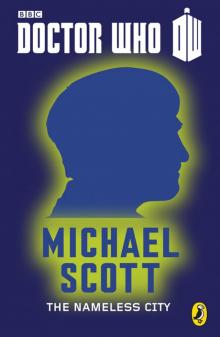 The Nameless City
The Nameless City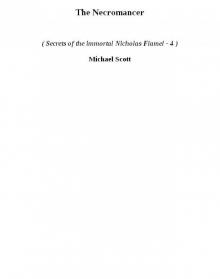 The Necromancer sotinf-4
The Necromancer sotinf-4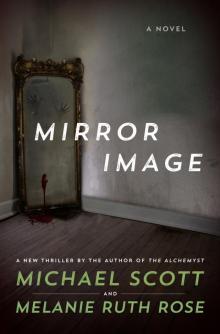 Mirror Image
Mirror Image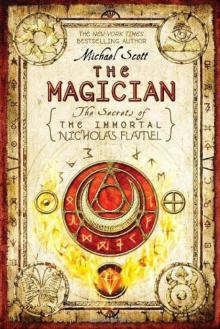 Nicholas Flamel 2 - The Magician sotinf-2
Nicholas Flamel 2 - The Magician sotinf-2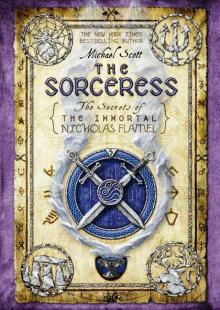 The Sorceress sotinf-3
The Sorceress sotinf-3